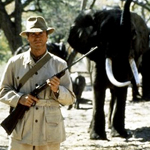 Clint Eastwood ended the ‘80s fighting neo-nazis in PINK CADILLAC, the action comedy directed by Buddy Van Horn, but he started the ‘90s directing and starring in something more self-reflective. In WHITE HUNTER BLACK HEART, Clint plays eccentric filmmaker John Wilson, who has planned to film a movie in Africa mainly so he can try to hunt an elephant while he’s there. He brings along a young writer friend, Pete Verrill (Jeff Fahey, DARKMAN III: DIE DARKMAN DIE) to polish the script and to pressure into going hunting with him. That character is based on Peter Viertel, who rewrote THE AFRICAN QUEEN for John Huston. The movie is based on a novel he wrote about it when he got back.
Clint Eastwood ended the ‘80s fighting neo-nazis in PINK CADILLAC, the action comedy directed by Buddy Van Horn, but he started the ‘90s directing and starring in something more self-reflective. In WHITE HUNTER BLACK HEART, Clint plays eccentric filmmaker John Wilson, who has planned to film a movie in Africa mainly so he can try to hunt an elephant while he’s there. He brings along a young writer friend, Pete Verrill (Jeff Fahey, DARKMAN III: DIE DARKMAN DIE) to polish the script and to pressure into going hunting with him. That character is based on Peter Viertel, who rewrote THE AFRICAN QUEEN for John Huston. The movie is based on a novel he wrote about it when he got back.
So Clint is a little different in this one. He moves and talks a little different, doing a partial imitation of Huston, and is more verbal than usual. Also he’s introduced wearing an ascot and sock-garters.
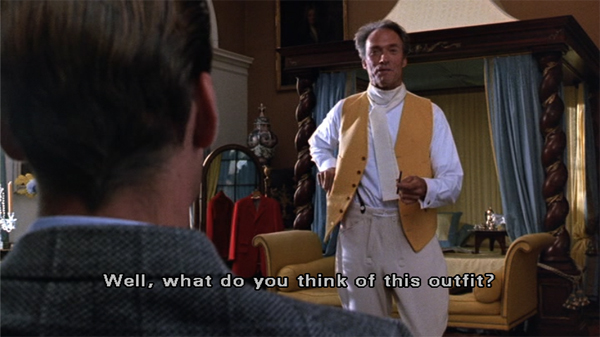
He’s still got some of the Clint cool, but he’s kind of comical until he becomes disturbingly out of control. In the opening narration, Pete describes him as, “A violent man given to violent action” and “a brilliant screw-you-all type filmmaker who continually violated all the unwritten laws of the motion picture business, yet had the magic, almost divine ability to always land on his feet.”
He lives in a huge mansion full of art and Roman columns, but it’s actually on loan from “one of his society friends.” Though he took the Africa gig to pay off a $300,000 debt, he also seems to take perverse pleasure in making everyone constantly fear the whole venture is on the verge of collapse. Producer Paul Landers (George Dzundza, SPECIES II), based on Sam Spiegel (LAWRENCE OF ARABIA), thinks the director has genuinely lost his mind, but Pete initially thinks ah, that’s just John, that’s how he acts. And there’s an appeal to his macho zeal for adventure and spontaneity. “There are times when you can’t wonder whether it’s the right or wrong thing to do,” he tells Pete. “Not for guys like you and me, kid. You just gotta pack up and go.”
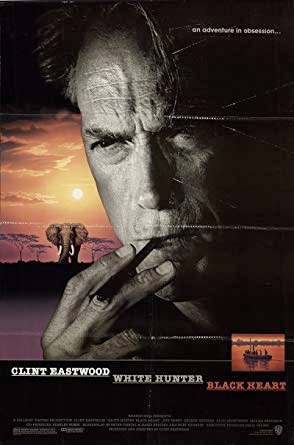 These two go way back. The director is impressed that Pete was a Marine and is a great skier. In real life the writer also introduced Huston to Ernest Hemingway in Cuba, which probly helped him to get in his good graces. But you know how it is when you have to work closely with somebody, or especially travel with them, the stress can bring out all the weaknesses in the friendship. Here Pete is a quiet presence, mostly an observer, watching with those big blue Fahey eyes, gamefully going along with the adventure until he’s forced to straight up tell him he doesn’t want to kill an elephant. Then things go sour.
These two go way back. The director is impressed that Pete was a Marine and is a great skier. In real life the writer also introduced Huston to Ernest Hemingway in Cuba, which probly helped him to get in his good graces. But you know how it is when you have to work closely with somebody, or especially travel with them, the stress can bring out all the weaknesses in the friendship. Here Pete is a quiet presence, mostly an observer, watching with those big blue Fahey eyes, gamefully going along with the adventure until he’s forced to straight up tell him he doesn’t want to kill an elephant. Then things go sour.
When Clint plays a director who’s full of himself, obviously there’s an element of self-critique there. But John’s nuttiness is also portrayed as fun some of the time. His sexism is one flaw I’m not sure we’re necessarily supposed to frown upon. It’s mostly treated as amusing that he keeps trying to get laid with young “dames” he has no respect for. One (Catherine Neilson, Widows 2) is an idiot who he thinks talks too much, another (Mel Martin) is an anti-Semite. He sleeps with one and spectacularly tells the other one off. The dumb one, admittedly, makes for a pretty great punchline when John sticks his producer with her pitch “about a dog. A puppy dog. He’s the hero, the star. The dog’s name is Horace.”
There are two smaller female characters who come off better. The movie and Pete (judging from a slight wince) seem to have their sympathies with John’s secretary Miss Wilding (Charlotte Cornwell, narrator of GHOSTS OF MARS) as he bosses her around and accuses her of being a spy. She doesn’t buckle, but she shouldn’t have to put up with that shit. And the actress Kay (Marisa Berenson, BARRY LYNDON) is clearly based on Katherine Hepburn, and shown appropriate respect. (She gets a slightly bigger part than Phil, the Humphrey Bogart character played by Richard Vanstone [THE KRAYS, LOCK STOCK AND TWO SMOKING BARRELS]).
The movie is more enlightened when it comes to its depiction of colonial Africa. Before leaving on the trip, John is delighted by a night club act with a man dressed as an African native stereotype playing a drum while a guy in a gorilla costume accosts a screaming blonde dancer. Clearly these white people have a skewed image of the place. Once the story moves to Africa (they filmed in Zimbabwe), Eastwood as director constantly makes us aware of the obnoxious and oblivious ways the white people act. The English guy who picks them up at the airport (Alun Armstrong, KRULL, BRAVEHEART, VAN HELSING) races down streets used by pedestrians, honking and calling them “stupid buggers,” complaining about how many of them have been run over. The hotel organizes a whites vs. blacks soccer game. White bosses stand around casually talking while an all black crew struggles to pull a steamboat out of the water for the movie.
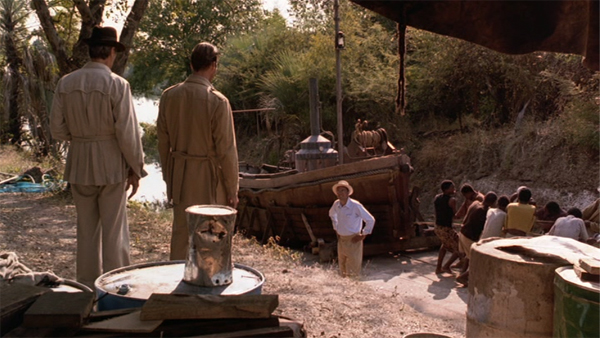
John gets us on his side by being aware of some of this shittiness. He probly just likes stirring shit, but sometimes he does it in the name of justice. When hotel manager Harry (Clive Mantle, ALIEN 3) pushes over a black waiter for spilling a drink, John challenges him to a fight. Of course, he also likes to make people squirm by blurting out racial slurs during his stands for equality (GRAN TORINO and THE MULE do similar things – Clint’s been an old man for a long time).
When John goes to train for elephant hunting he becomes very enamored of a local guide named Kivu (Boy Mathias Chuma). He keeps mentioning how great Kivu is and asking for his opinion on everything even though they don’t speak the same language. Basically Kivu becomes a replacement for Phil, who he doesn’t want to play with anymore.
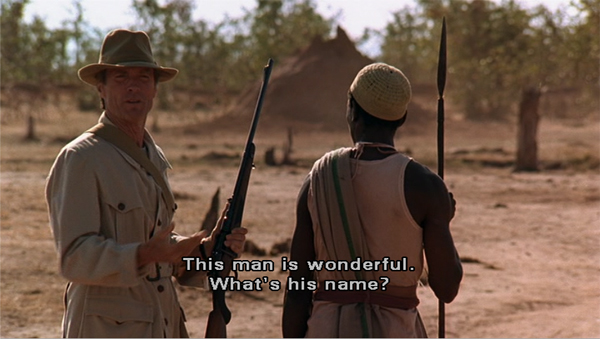
In one scene I was very conscious of Kivu standing up while all the white people got to lounge around. Then John asks the translator to ask Kivu to sit down, and he says he’d rather stand. There are other African employees standing, not invited to sit down. Maybe Kivu doesn’t want to sit if they have to stand. Maybe he just doesn’t want to sit. Or maybe he doesn’t want to sit with these guys.
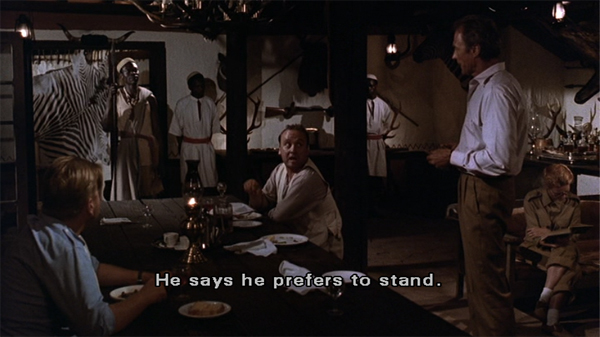
John moves the production to Kivu’s village. It’s partly because he’s trying to get that elephant, but also seems like more evidence of his fascination with Kivu. Landers considers shutting down the whole production until Pete convinces him to be honest with the cast and crew and tell them this will be good for the movie, despite being an unpleasant place to stay. But John wins them over when they get there. He’s wearing a white tuxedo, petting a small monkey, and welcomes them with a feast in a fancy hunting lodge. I can’t tell if he’s joking when he says Kivu did rewrites on the script he hands over to Landers. But then a monkey attacks the script (everyone thinks it’s hilarious) so maybe nobody ever finds out the answer to that.
Of course, when things get dangerous out there it’s Kivu who (SPOILER) gets gored, not any of his white bosses or clients. And when the crew returns to the village without him and we hear the outpouring of grief from his loved ones it’s a gutpunch. The title of the movie is their description of John. Not flattering.
When he talks about making movies he seems much cooler. He hates anyone telling him what to do or pandering to commercial expectations. When Pete says that “people don’t go to see pictures to be lectured to,” John asks, “Tell me Pete. Do you own a percentage of this film?”
“No.”
“Then why are you so concerned about the damn audience?”
He tells Pete he’ll never be a great screenwriter “because you let 85 million popcorn eaters pull you this way and that way.” He plans to die broke but “have contributed maybe five, ten damn good pictures.”
He’s proud of his “factory town.” During a great harangue about people who say “Hollywood” as an insult, he blames the “cheap element of the town,” the “whores who sell words and ideas and melodies,” admitting “I’ve done a little hustling in my time, a hell of alot more than I’d like to admit to. And what I sold when I was whoring I’ll never get back.”
By most accounts, including Viertel’s, Eastwood is not a pain in the ass to work with. He loves actors and moves quickly and has had a decades long relationship with a studio. There are people, including some of my online pals, who hate Clint’s work now. I’m sure the increasingly reactionary politics he expresses in interviews are part of it, as well as new attention being brought to shitty things he’s done in his life, including using his clout to damage the career of his ex-wife Sondra Locke. But they also consider him lazy, make fun of his famous preference for first drafts and limited takes, even accuse him of not really directing his (very distinct, always interesting, often great) movies.
Sure, I could do without some stiff performances in GRAN TORINO, and some on-the-nose dialogue in THE MULE. (I didn’t notice the fake baby in AMERICAN SNIPER.) But those things are easy to forgive when they come with Eastwood’s laidback directorial style. The directness and lack of flash is a major part of their power. It’s like that Mr. Rogers quote: “Deep and simple is far more essential than shallow and complex.” When John argues with Pete about the screenplay, I suspect Clint agrees with him. “Things are always good if they’re left simple,” he says. “That’s what creates truly important art, is simplicity.” He says that Hemingway “always reduced life to its simplest terms, whether it’s courage, fear, impotence, death. People’s lives just sort of unfold, and things just happen to them one thing after another. They were never bogged down with that nonsense of subplot that we sweated over in the past… No, Pete. Don’t complicate it. You’ll just be wasting your time.”
Then again, he seems to be saying that partly so Pete will finish soon enough for them to go on safari.
Viertel’s book came out two years after THE AFRICAN QUEEN, but he was still around to do revisions on the screenplay for this. I don’t think Clint made him go to Africa or kill any animals. In 1990 Viertel told the LA Times, “When the book came out, a lot of people accused me of stabbing John in the back. I really wrote the book as a personal letter to him. I was very, very fond of him. Outside of Billy Wilder, I thought he had more potential than any other filmmaker, and I didn’t want him to piss it away.”
Viertel actually stayed friends with Huston and worked on BEAT THE DEVIL, THE MAN WHO WOULD BE KING, HEAVEN KNOWS MR. ALLISON and NIGHT OF THE IGUANA with him. He says Huston offered to (and did) sign a release for the book before even reading the manuscript, and that when he did read it he suggested a darker ending that made himself look worse, which Viertel then used. (The movie apparently ends differently because Clint wasn’t big on hunting.) “After that, John never mentioned the book again to me, not once.”
As of this writing, WHITE HUNTER BLACK HEART is 29 years old – older than Clint’s episode of Mister Ed was when WHITE HUNTER BLACK HEART came out. He had to pause filming on THE ROOKIE – a decent buddy action movie he did in exchange for Warner Brothers letting him do this – to attend its screening at the Cannes Film Festival. That was expensive, but worth it, because he got to meet Akira Kurosawa.
WHITE HUNTER BLACK HEART came out in September of 1990 and only made around $2 million on a budget twelve times that. THE ROOKIE came out less than three months later and did okay. Like his fictional character, I doubt Clint felt “concerned with the success of the venture at this moment.” He wasn’t trying to make HOME ALONE, GHOST, PRETTY WOMAN or TEENAGE MUTANT NINJA TURTLES. Yeah, maybe the year’s #3 hit DANCES WITH WOLVES was intruding into his actor-director-serious-western territory, but who gives a shit? Two years later he had UNFORGIVEN, which was a hit, won Oscars for best picture, best director, best supporting actor and best editing, and was legitimately one of the best movies he ever made. Then he didn’t have to make THE ROOKIEs anymore to hunt his elephants.


























January 1st, 2020 at 1:03 pm
i remember this movie. there is a great scene where he takes a pencil and a sketchpad and sketches a lovely portrait of a beautiful woman. then adds a hitler mustache. i don’t think he liked her. if my memory serves me right her character was a horrible racist. i can’t find the sketch scene but there is this one: